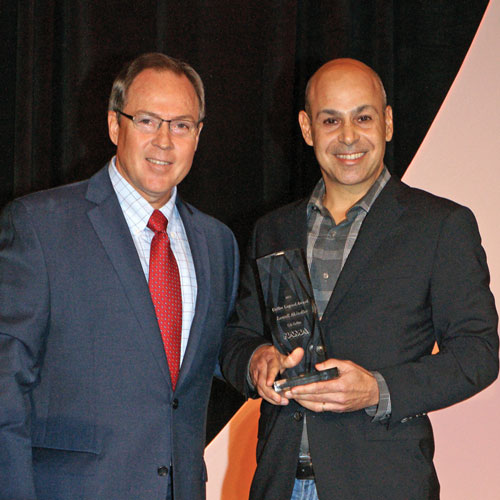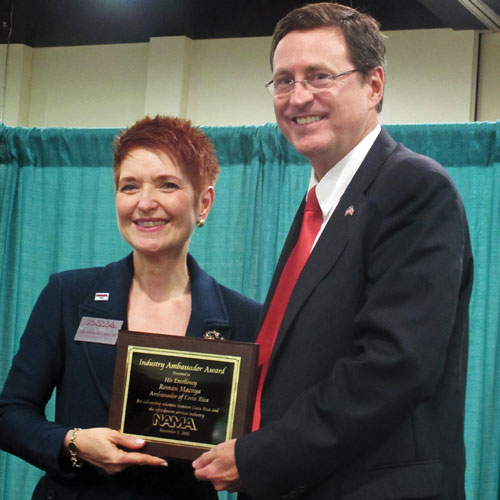News
NAMAs Coffee Tea Water Symposium Takes Closeup Look At Beverage Business
December 20, 2015
TAGS: vending, office coffee service, workplace beverage services business, National Automatic Merchandising Association, Coffee Tea & Water conference, Bottled Water Association, Gaylord National Resort and Convention Center, NAMA 2015 CTW, Carla Balakgie, Howard Chapman, Seth Goldman, Mike Dabadie, Keurig, Chris Stevens, Lowell Shindler, NAMA Coffee Legend, Román Macaya Hayes |
NATIONAL HARBOR, MD -- The fast-changing workplace beverage services business went under the microscope at the National Automatic Merchandising Association's 8th annual Coffee, Tea & Water conference. Again held in conjunction with the International Bottled Water Association's annual convention and trade show, the 2015 CTW, held Nov. 2-4 at the Gaylord National Resort and Convention Center here, attracted more than 100 exhibiting companies, 30% of which participated for the first time this year, and nearly 800 registrants.
NAMA president and chief executive Carla Balakgie welcomed conference-goers to the opening general session, the theme of which was "Driving Growth through Innovation," by reporting that this year's conference offered a number of firsts. These included a new series of early-bird "tech talk" workshops and the first visit to the convention by an ambassador to the United States, His Excellency Román Macaya Hayes, who heads the Costa Rican embassy in Washington. Also new were a presentation by the U.S. Environmental Protection Agency on the application of Energy Star efficiency standards to coffee brewing equipment, one of 13 education sessions scheduled during the two-day event. There also was the inaugural Fun Run/Walk, organized by NAMA's Women In the Industry special-interest group.
The NAMA president introduced NAMA's new vice-president of information and communications, Chip Potter, who is succeeding Dean Gilland in the post, and recognized the association's Coffee Service Committee for its efforts in building the annual Coffee, Tea & Water show into a preeminent industry event.
 |
PICTURED,from left, are Carla Balakgie, Howard Chapman, Seth Goldman, Mike Dabadie and Chris Stevens |
Balakgie then turned the microphone over to NAMA president Howard Chapman, Royal Cup Coffee (Birmingham, AL), after congratulating him on his recent promotion to president of the company's coffee service division.
Chapman presented the NAMA Coffee Legend Award posthumously to Lowell Shindler, U.S. Coffee (Hicksville, NY), in recognition of the late pioneer's consistent record of innovation and industry leadership in the greater New York City market over a career that spanned more than four decades. Accepting the award on behalf of his father was Douglas Shindler, a principal of U.S. Coffee.
Balakgie took the rostrum again to introduce Seth Goldman of Honest Tea, a groundbreaking producer of beverages formulated with organically grown ingredients and less sugar, sourced under "fair trade" agreements. Goldman founded the company in 1998; in 2008, The Coca-Cola Co. paid $43 million for a 40% stake in Honest Tea, and acquired the remainder four years ago. Goldman now serves as "TeaEO" of the enterprise.
Recognizing A Need
"It all started when we saw that there were no packaged cold drinks on the market that contained less than five teaspoons of sugar," Goldman said in his keynote address. His interest in tea led him to experiment, and to investigate the production of the ancient beverage in India. That research also led him to tulasi, a form of basil long used in the Indian subcontinent to prepare a popular infused "herbal tea" (tisane). And it brought him into contact with tea growers on the Indian subcontinent who shared his concerns over sustainable agriculture and fair labor practices.
Tea, Goldman noted, is sold in black, green and white varieties, but all are made from the leaves of the same bush, Camellia sinensis. The difference is in the processing; "white" tea is made from leaves that have undergone minimal processing; "green" tea leaves are heated to halt their oxidation, while "black" tea leaves are processed by allowing oxidation to take its course. Oolong tea leaves also undergo fermentation.
Working with these leaves, Honest Tea developed a line of ready-to-drink beverages that are flavorful but not excessively sweet. Test-marketing found considerable demand for ready-to-drink teas with those qualities, and the Whole Foods supermarket chain showed gratifying interest in the line.
Goldman gave a lively and entertaining account of the company's initial difficulty in securing large-scale distribution. "Large distributors said, 'Your product isn't sweet enough, it's too expensive and it tastes kind of like grass,'" he recalled.
Honest Tea worked through this by pursuing what Goldman calls "C" distributors (cheese, corned beef and charcoal), who served retail outlets whose clienteles are receptive to upscale natural products.
"And the 'natural' channel worked for us," the keynoter explained. "We needed to 'democratize' organics. The demand was there." Honest Tea, he pointed out, is positioned at the intersection of three growing consumer concerns -- health and wellness, environmental consciousness and social responsibility -- and Coca-Cola recognized the value of this position. Coke's buy-in provided access to the soft drink giant's very extensive distribution network.
After a candid review of the company's hits and misses during the eventful 17 years since its formation, Goldman suggested some principles underlying business success. "First, know what business you're in," he advised. "We found that 'tea' was not as important to our customers as 'honest.' You provide drinks and snacks that refresh and energize your customers; is there more you could do for them in these areas?"
Second, beverage and food purveyors can help guide their patrons along a better path toward health, the speaker pointed out. NAMA's "Fit Pick" program offers the tools to do this; the key is to elevate the profile of healthier products.
Third, find ways for your consumers to be involved, Goldman recommended. One way to do this might be to spotlight wellness-oriented products with a monthly promotion. "How about making one of the shelves in the snack machine an audition stage for the latest items and let patrons vote for their favorites by buying them, and then report the results?" he asked.
The Honest Tea founder concluded his keynote address with two proverbs which are said to be Chinese. "If we don't change the direction in which we're headed, we'll end up where we're going" is the first one. "Look at national life-expectancy averages. Japan ranks first, Switzerland is second -- and the United States is number 40! We need to give people the opportunity to move toward health," Goldman emphasized.
And he added that the second proverb is: "Those who say it cannot be done should not interrupt those who are doing it."
Educational Opportunities
Educational sessions followed the opening general meeting and keynote address, including a potentially adversarial examination of Internet coffee service, featuring online OCS marketing pioneer Kirby Newbury of discountcoffee.com (Saint Peters, MO) and Ken Shea, a veteran of OCS distribution, operations and consulting, who now serves as vice-president of coffee development for DS Services of America (Atlanta, GA). Newbury, who entered wearing a wrestler's robe, explained the promise and pitfalls of using the Internet to sell a service traditionally provided locally. Shea admitted that he, as an operator, has considered office supply firms and Internet coffee marketers as "remoras," parasitic sharks that live by sucking the blood of successful operating companies. Newbury retorted that operators giving good service in their market area are in very little danger of losing customers to online marketers -- and the sales they lose will be of items they don't carry, but the e-commerce operation does. It is not an easy business, he reported, and its primary appeal is to clients too small to interest local OCS operations.
At the same time, Robin Householder of Crystal Mountain Products led a workshop on the state of water in the OCS industry, today and in the immediate future. He brought his audience up to date on the chemicals that municipal water companies use to render their water safe for human consumption. These chemicals usually have an adverse impact on the flavor of the water -- and on beverages prepared with it. This has led to growing demand for point-of-use water treatment, which the OCS industry is addressing. Householder provided an overview of traditional, new and emerging POU treatment technologies, and urged operators to be proactive and to do their homework on water quality issues.
Also concurrently, Dr. Mike McCall of Michigan State University (E. Lansing, MI) described the hows and whys of implementing loyalty programs in a business-to-business rather than the usual business-to-consumer context. Dr. McCall examined best practices, walked the participants through a case study, suggested new ways to gauge the value of loyalty programs and explained the potential benefits of forming B-to-B partnerships.
Competitive Edge
CTW showgoers also had a choice of three concurrent seminars in the second round of educational presentations. Mike Tompkins, Coffee Products Associates (Chicago), who conducts the NAMA Quality Coffee Certification Program, moderated a panel session on "selling the sizzle," thereby gaining a competitive edge by delivering service plus an experience. His panelists were Linda Salanda, Southern Refreshment Services (Tucker, GA); Paul Tullio, Gourmet Coffee Service (Van Nuys, CA), and Timothy Bielaski, Royal Cup Coffee (Birmingham, AL). The goal is to create a value proposition that provides an effective alternative to attempting to win the sale by offering the lowest price. Components of the "experience" include high-quality products, fast and effective service, the opportunity to take advantage of "bundled" products and the real value of OCS as a benefit to employees.
At the same time, John Turenne of Sustainable Food Systems LLC (Wallingford, CT) led a discussion of social responsibility and sustainability, two supplier attributes that are increasingly important to today's decision-makers. Turenne described the options available to workplace service operators for adopting sustainable practices, and explained the trade-offs that are encountered when executing this policy shift. He emphasized the need to walk the walk as well as talking the talk, pointing out that patrons and clients to whom the subject is important are increasingly acute in recognizing "greenwashing" as a marketing ploy. Turenne concluded by outlining credible and impactful methods for communicating an operation's commitment to sustainability in the context of overall social responsibility.
Simultaneously, John P. Healy of Healy Consulting & Communications (Chicago) presented an overview of effective ways to use social media and other digital communications in business-to-business sales and marketing. He concentrated on the power of LinkedIn as a medium for building closer relationships with clients, establishing and reinforcing credibility by demonstrating "thought leadership" and so creating an "inbound funnel" of sales leads. Healy went on to explain that the necessary complement to this process is a practical outbound email marketing program of the sort that Constant Contact conducts for its clients. He touched on the strengths and weaknesses of less focused media, such as Twitter and Facebook for business.
Early Start
Tuesday's program led off with the WIN Fun Run/walk. After participants had caught their breath, the second general session got under way as NAMA chairman Howard Chapman introduced Mike Dabadie, Heart + Mind Strategies (Reston, VA) and keynote speaker Chris Stevens, Notre Dame University Mendoza College of business (South Bend, IN). Stevens is a founder of Keurig Inc., which launched its novel portion-pack, single-cup brewing system in 1998 and was acquired by Green Mountain Coffee Roasters (Waterbury, VT) in 2006. The merged organizations became Keurig Green Mountain in 2014.
Themed "Bubbles, Blends and Brews," the two-part program began with market researcher Dabadie's overview of the present state of the office coffee business. "It's very strong," he said, with revenue growing briskly in the wake of the recession. Account sizes continue to increase, and single-cup systems are gaining market share steadily. He noted that the rising "millennial" generation tends to make decisions on the basis of their effect on others, and they value sustainability accordingly. This will impact the businesses supplying them. Dabadie also noted the influx of new product categories, and urged operators to stay alert to growing demand. He noted, too, that some 6% of office coffee businesses today have no Internet presence, and about 48% do not accommodate online ordering. He suggested that the industry's challenge at present is to widen its pool of customers by adding new in-demand items and finding ways to communicate the OCS value proposition to new customers.
Stevens briefly recounted the history of Keurig. The founders' vision of a compact single-cup fresh-brew system included as a goal the creation of a coffee format that would provide unparalleled convenience, and enable OCS operators to sell it for five times what businesses were paying for a cup of batch-brewed coffee. "Coffee service operators -- Lowell Shindler [U.S. Coffee], David Henchel [Corporate Coffee System] -- believed in Keurig. You made this business," he told the audience.
The second part of his presentation involved a roundtable exercise designed to stimulate innovative thinking. "Remember: if you don't like change, you'll like irrelevance even less," he summed up.
On Wednesday, concurrent educational programming resumed with three concurrent business sessions. John Salterio of Consolidated Services Group of Exeter (Exeter, NH) described the steps needed to smooth the transition when planning to sell or transfer ownership of a company. He described the key elements in a succession plan that will involve minimum disruption, and suggested ways to determine when the time has come to pass the baton of leadership, and tools for financing the transfer of ownership to the next generation or to employees. Salterio also discussed increasing the appeal of a business to qualified buyers.
At the same time, David Carroll of Southern Refreshment Services (Tucker, GA) explored the expanding range of single-cup brewing options available to OCS operators. He reviewed the characteristics of each type of equipment and explained the attributes of each in relation to the specific characteristics and needs of clients. The speaker then explained the calculation of the time required to recover the cost of a new single-cup brewer, and ways to determine whether it makes sense to replace a client's existing brewers with a more sophisticated system.
Concurrently, Carla Variglotti of The Cuyahoga Group (Maple Heights, OH) explored the role of "generational understanding" in building better customer relations. She explained that the way customers think is conditioned to a greater or lesser extent by the generation into which they were born. For this reason, customer relations are strengthened by a grasp of the differences in the desires and expectations of the age cohort one is serving. That task is made more complex because today's workplace typically is populated by members of four generations, from millennials to baby boomers. Variglotti outlined the differences in value perception associated with each generation, the qualities making each of them unique, and effective ways to engage customers by knowing what to do and what to avoid when addressing this complex clientele.
Strong Finish
The formal education program concluded with four concurrent seminars. Scott Berman of Canteen Refreshment Services (Woburn, MA) led a panel session on dealing with today's increasingly competitive marketplace; his panelists were Dan Ragan, Pod Pack International (Baton Rouge, LA) and Tom Steuber, Associated Services (Concord, CA). The discussion revolved around new types of competitor, in addition to other coffee service operations and explored who they are, how the business is changing and methods for evolving during an era of swift change. They critiqued the conventional OCS business model in regard to workable growth strategies, explored the nuts and bolts of an operation's financial success and suggested methods for measuring progress toward attaining it. The panelists also probed the qualities that can differentiate an operator's business from its competitors, especially in terms of adding value for the client.
At the same time, Andrew Siff of Siff & Assoc. PLLC (Washington) offered an update on the Department of Labor's proposed changes to overtime rules, the Wage and Hour Administrator's guidance on determining when employees have been misclassified as independent contractors, issued in July of this year; and the Federal Acquisition Regulatory Council's proposed regulations to implement President Obama's executive order on Fair Play and Safe Workplaces. That order also involves guidance from the Department of Labor, and compliance with the new rules will affect a company's eligibility for federal contracts.
If implemented as drafted, these new rules will (among other things) result in a very substantial increase in the minimum salary defining a "white collar" employee who is exempt from minimum wage rules. Siff noted that NAMA has filed "excellent comments" on the injurious consequences of such redefinition, Siff reported.
The fourth business session was led by Dan Mathews, executive vice-president and chief operating officer of NAMA. Mathews discussed best practices in networking, goal-setting and time management. He offered guidelines for creating well-defined, measurable objectives to serve as waypoints in mapping one's course; managing time more effectively; and honing one's networking skills.
Wrapping up the 2015 NAMA Coffee, Tea and Water convention was a closing general session, "Tea Time with Stephen Twining." Twinings Tea was established in London, England, in 1706, and the firm has been run by 10 generations of Twinings. The speaker offered a relaxed account of the varying fortunes of tea and its increasing popularity today.
 |
LEGEND:Doug Shindler (right), U.S. Coffee (Hicksville, NY) accepts Coffee Legend award on behalf of his father, the late Lowell Shindler, in ceremony at CTW confab; making the presentation is NAMA chairman Howard Chapman, Royal Cup Coffee (Birmingham, AL). The award honors the elder Shindler's contributions to the OCS business during his pioneering 44-year career in the New York metropolitan area. |
 |
STATE VISIT:His Excellency Román Macaya Hayes, Costa Rica's ambassador to the United States, receives NAMA's first Industry Ambassador Award from association president Carla Balakgie at reception during Coffee, Tea & Water show. Costa Rica was the host country for NAMA's first "Origin Tour" in 2013, during which an industry delegation toured Santa Elena Coffee Estate in the nation's renowned Tarrazú Canton. |
 ChatGPT
ChatGPT Grok
Grok Perplexity
Perplexity Claude
Claude






